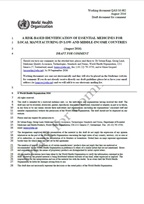.tmb-1920v.jpg?Culture=en&sfvrsn=b66a70c7_1)
Strengthening local production is a cross-cutting endeavour led by the Local Production & Assistance Unit (LPA). Sustainable local production requires effective multisectoral collaboration to promote an enabling investment, legal and technical environments. Lessons learned in providing technical assistance to manufacturers suggest that the scope of assistance needs to be expanded beyond GMP and quality assurance standards into other key areas such as business and policy considerations, which are necessary for local production to be successful. Against this backdrop, the LPA Unit, in collaboration with the Regional and Country Offices, is providing targeted support on key enabling factors for the successful local production of quality-assured medical products at country level, such as the implementation of the National Strategy and Plan of Action for Pharmaceutical Manufacturing Development in Ethiopia (NSPA-Pharma), as well as support for the risk-based identification of essential medicines for local manufacturers in designated countries.
The Global Strategy and Plan of Action on Public Health, Innovation and Intellectual Property (GSPA-PHI), adopted in 2008, includes local production and technology transfer as an approach to stimulate needs-based innovation, build capacity and increase access. Member States highlighted the importance of local production at the 71st World Health Assembly (WHA) during discussions on the global shortage of, and access to, medicines and vaccines. Resolution WHA72.8 on improving the transparency of markets for health products urges national capacities for quality local production to be improved. And resolution WHA74.6 on strengthening local production of medicines and other health technologies to improve access.
Country Mission
NSPA-Pharma in Ethiopia
Product selection for local production



